#liberalisation
Explore tagged Tumblr posts
Text
10 lessons from Dr Manmohan Singh’s political life
India’s first Sikh prime minister was no ordinary head of government. As India’s finance minister, Dr Manmohan Singh was responsible for ushering in free-market reforms in 1991 that transformed India into an economic engine. Later, he was made the prime minister by the Congress Party. He led the government from 2004 to 2014. These 10 years were replete with rich lessons for politicians.
#BJP#Congress#Dr Manmohan Singh#Dr Singh#India#Indian economic reforms#Liberalisation#Manmohan Singh#Modi#Narendra Modi
0 notes
Text
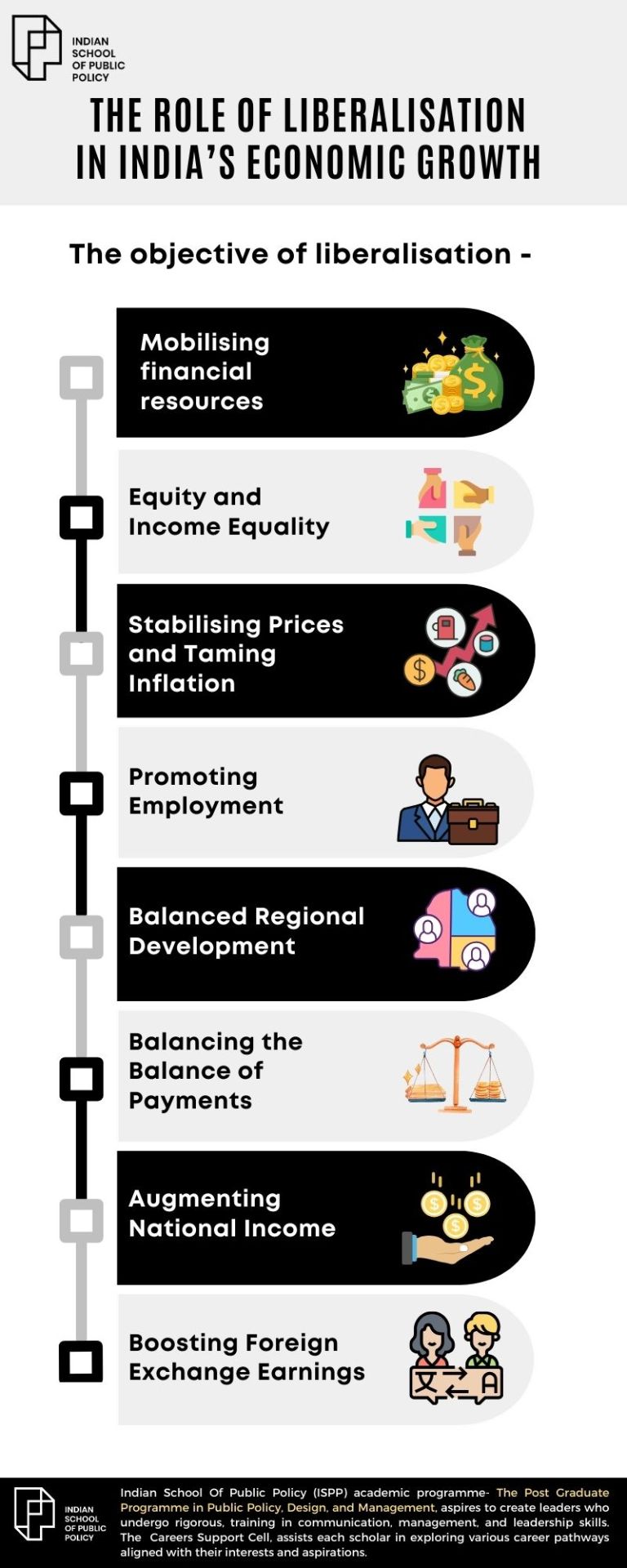
The Role of Liberalisation in India's Economic Growth
Explore the impact of liberalization on India's economic growth in this insightful article. Learn how economic policies have shaped the nation's progress.
0 notes
Text
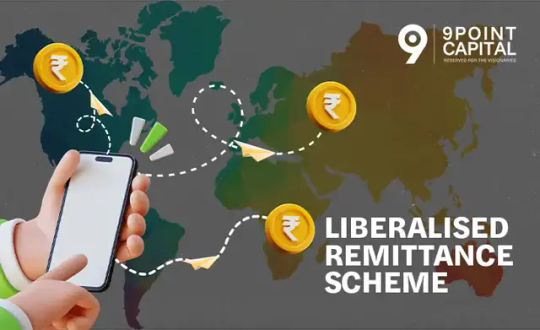
Explore global investments with LRS! Indian investors can remit $250,000/year for U.S. stocks, ETFs, Bitcoin ETFs. Learn RBI rules tax benefits.
1 note
·
View note
Text
Government Employees Beware: How Casual Leave Can Impact Your Family’s Pension Rights
“Delhi HC rules no liberalised family pension for deaths during casual leave without a direct link to official duty. Learn about the judgment, its implications, and latest trends in family pensions in India. Essential reading for government employees and families navigating pension eligibility and benefits.” In a significant ruling that has far-reaching implications for government employees and…
#Bhavishya pension portal#casual leave death#Delhi HC ruling#direct causal link#enhanced pension benefits#family pension eligibility#government employee pension#liberalised family pension#pension rules 1972#Supreme Court pension cases
0 notes
Text
A Homage to Dr Manmohan Singh: The Architect of Modern India's Economic Renaissance
A Homage to Dr Manmohan Singh: The Architect of Modern India’s Economic Renaissance In the annals of Indian history, few leaders have demonstrated the profound combination of intellectual brilliance, humility, and steadfast commitment to national progress as Dr Manmohan Singh. As we pay homage to this extraordinary statesman, it is imperative to reflect on the immense contributions he has made…
#Dr Manmohan Singh#Economic Liberalisation#Economic Reforms#Economic Transformation of India.#Global Diplomacy#Humble Statesman#India’s Growth Story#India’s Prime Minister#Indian Economy#Indian Politics#Indo-US Nuclear Deal#Leadership in India#MGNREGA#Political Integrity#Tribute to Dr Manmohan Singh#Visionary Leader
0 notes
Text
In light of the recent attack upon an elderly Muslim gentleman in India, who was assaulted by Hindu extremist sanghis on a train for carrying beef, here are more essays to read, demonstrating how the concept of "pure vegetarianism" in India cannot be separated from ideas of caste hierarchy, oppression of marginalized groups and how foods and diets of different groups are shaped as much by economic disparities as by belief and spirituality:
Note: I know this shall breach containment soon but yeah, white vegans, "pure" vegetarians, and sanghis don't touch this post.
#resourcess#casteism //#islamophobia#casteism#books#essays#activism#india#hindutva#mimiwrites#ethnonationalism#politics#caste politics
877 notes
·
View notes
Text
so your job employs minors under certain conditions. what if a minor just worked at the frontdesk of a brothel? would that be okay since theyre not being fucked until theyre 18? what is the issue about prostitution that applies to minors but not adults? minors are allowed to have sex, unlike for example drinking alcohol or driving a car, which is what is keeping them out of certain jobs, but they can and do have sex so whats the issue? what if only other minors are allowed to buy sex from them, is it okay then? if sex is neutral, and sex is a service, and sex is labor, why would there be moral issues with minors in prostitution? and why do they vanish once a girl turns 18?
people actually realise that sex is not a neutral service but a moralised interaction for a reason. and its wild they can apply this to minors but not adults, as if sex stops being an intimate and vulnerable act once you turn 18. „minors cant consent to sexual actions with adults“ just highlights how important freely given consent is. its assuming that minors dont have the cognitive ability yet to consent to sex (with adults). its a general assumption about minors to protect them.
yet despite the inherent issues with bought consent - relying on income arguably diminishes the freedom of choice - there are no general assumptions made about women in prostitution to protect them, even though the few statistics show that most of them are marginalised, without alternative and often impoverished. adults can be vulnerable too, and especially vulnerable groups are being systematically exploited in the sex industry. just because you have the cognitive ability to consent, does not mean you are in a position to give it freely. the premise of prostitution is that consent is circumvented with money, and money is power, so this is usually a process of a man using his power to get a less privileged woman (sometimes man) to serve him sexually. laws about the age of consent are in effect to protect minors from being abused. yet there are no laws in effect keeping men from sexually abusing other vulnerable groups through prostitution (where i live, and in many places its prostitutes who get punished, not sex buyers).
lets say prostitution is a profession. minors are allowed to work, under certain conditions. why shouldnt 14, 15 and 16 year old girls prostitute themselves for some extra allowance, do some porn after school, do an internship in a brothel? if this thought makes you uncomfortable, you realise that the sex industry is not like any other industry. that perhaps, sexually satisfying men is not a viable career or profession for young girls. its not lack of skill or responsibility stopping teenagers to enter the sex industry like it does with some jobs. because thats not needed to be used as a sex object. in fact, a lot of sex buyers and porn consumers specifically look for young and unexperienced women - men in general actually. the next logical step of legalisation, of treating prostitution as a profession, of bending to the demand, is this. not to be a slippery slope stacy but i wish this was something more people considered.
#kind of a monologue but whatever#anti prostitution#and as usual they focus on whatever anecdotal evidence they have instead of the bigger picture#and most of the points i brought forward are not considered#for example what bending to the demand which is what liberalisation of prostitution is really means
703 notes
·
View notes
Text
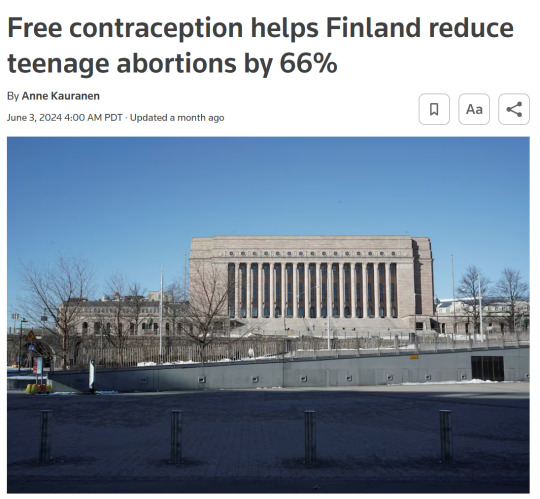
"The number of teenage abortions in Finland fell by 66% between 2000 and 2023, its public health institute THL said on Monday, attributing the reduction to the offer of free contraception to adolescents and compulsory sex education in schools.
Finland also passed a law in 2022 liberalising abortion, at a time of deep divisions over abortion rights in Europe and court rulings in the U.S. that restricted access to terminations of unwanted pregnancies for millions of people there.
The number of abortions among women under 20 rose during the 1990s in Finland, which led the Nordic country to respond at the start of the 2000s by making morning-after pills available without prescription from 15 years of age and sexual education compulsory in all schools.
"We can assume that sexual education plays a significant role," THL's research professor Mika Gissler told Reuters, adding that increased access to contraception from a young age was another factor behind the change.
The number of abortions fell 66% to 722 in 2023 from 2,144 in 2000 among all teenagers aged 19 or younger in Finland, while the drop was even steeper at 78% among those under 18 in the same period, THL's statistics showed.
"Since the latter half of the 2010s, the decline in the number of young people's abortions has also been influenced by the introduction of free contraception in many welfare regions," THL wrote in a report...
Under the 2022 liberalisation, Finland from September 2023 stopped requiring women to give a reason for having an abortion, making it available upon a pregnant person's request during the first 12 weeks of pregnancy.
[Note: That's actually not a very long window for abortion! Many conservative states in the US have actually instituted 12-week bans, and it's caused terrible upheaval and limits to medical services. Sounds like Finland should liberalize further, imho! Still, important progress!]
THL said it was too early to conclude whether the legislative change, which took effect last year, will have an impact on the number of abortions."
-via Reuters, June 3, 2024
#abortion#pro choice#abortion is healthcare#reproductive rights#womens rights#birth control#trans rights#contraception#finland#if conservatives actually cared about reducing the number of abortions#they would be advocating for contraception and sex ed#the only things actually PROVEN to reduce abortion rates#which bans. yknow. fucking don't.#at most bans reduce the number of LEGAL abortions#and in some places such as iirc north carolina in the past year they don't even do that#but yeah people just start having illegal abortions instead#okay psa over#bodily autonomy#good news#hope
745 notes
·
View notes
Text
It's always tragic thinking of the brave revolutionaries who fought to build Socialism in their nation only to one day to watch it fall, but not all of them gave into despair. Marcelino Dos Santos* displayed this admirably in a 1993 interview with South African journalist Tony Hall. Remember that this was a period when Socialism was in full retreat both regionally and globally. Many Communist parties had been outright overthrown, while many others (including Dos Santos' own FRELIMO) had been forced to embrace Capitalism to avoid replacement by an even more rapacious agent of Imperialism. Even the surviving Socialist nations were liberalising to an uncomfortable extent and the Imperialists themselves, revelling in their apparent victory, gleefully predicted that these last bastions of Socialism would soon fall. Yet even in these seemingly hopeless conditions, during an absolute nadir of Socialist power right around the world, Dos Santos had this to say:
The Destruction of the socialist states in eastern Europe was a defeat for the socialist movement- and the fact that Mozambique is no longer a socialist country; and that Angola has also moved away from state socialism. But that doesn't mean that future generations will not take to socialism... patience! Now it seems a fatal situation but humanity is always in revolution... slavery, feudalism, capitalism, socialism - history is in motion. Do people think that now we have reached the stage where history has stopped? Be patient, I say
*former Vice President of Mozambique. At the time of the interview he was Speaker of the Mozambican People's Assembly and the second most important member of FRELIMO's Politburo
329 notes
·
View notes
Text
it's interesting to look at jane crocker's political career not always in terms of how it makes her a ""fascist monster"" so to speak - along the lines of homestuck's literal fascist monsters like the condesce and lord english - but in how it plays into the crucial fact at the heart of her character that she is "normcore". jane is a character of the context she was born in, the almost-exact midpoint of the barack obama presidency; superficially and popularly, a time of great optimism for a liberalising america, but through this facade of optimism a time which also saw a great deal of "normalisation" of deeply evil american imperialism both abroad and at home.
jane's love of the NBC's Parks & Recreation is emblematic of this. homestuck and parks & rec are similar in one respect, which is that p&r also began and ended over the course of the obama presidency - and like jane, p&r is deeply of that era. in many senses it is the ancestor to the "copaganda" of programming like Brooklyn 99 which took over its position of popularity into the trump era: at the core of its comic dynamic is the interplay between leslie knope, a progressive-liberal "girlboss" and champion of big government, and ron swanson, the hard-working, moustache-toting libertarian sentinel of private capitalist interest. but in the classic mode of liberal american thought, the core message of the show is that these two characters are friends. despite the complete incompatibility of their respective ideologies, the two must work together and make compromise at every stage, ensuring that the political landscape of america - implicitly the perfect state - never changes or progresses from where it is now. and it's telling that, despite being the liberal "girlboss" with visions of political ascendancy, jane's love and admiration is for the male character. like obama himself, swanson serves to put a friendly, sometimes goofy but always loveable face on american patriarchal hegemony.
because by the time homestuck had closed up and the post-canon had opened america had crossed that threshold from obama's presidency into the next, it's impossible not to draw parallels between jane's descent into xenophobia and the overt isolationism of the trump republican administration. but i think putting jane on this trajectory is also in a very real sense just as much an indictment of the democrat majority of homestuck's genesis; xenophobia is not a "trump problem" but rather an AMERICA problem, and in fact the political landscape of the late 2010s and 2020s is an inevitable progression of the kind of politics that were considered "normal" in 2011, not the result of some freak misstep of electoral probability in 2016.
474 notes
·
View notes
Text
#economic policy in india#new economic policy of india#liberalisation of indian economy#liberalisation policy in india#current fiscal policy of india
0 notes
Text
Without bothering to look up anything in particular about sweet brother, I suspect it's the opposite: Sweden has exactly one lottery, it's run by the state, and the payouts are extremely easy to track down in public records. So it's easy to get the data and be sure you're studying everyone who won, no selection bias.
Not fact-checked, obviously, but I have this vague sense that I’m constantly seeing observational studies about Swedish lottery winners. The latest ACX linkdump has one, and there were previously influential ones about “what does winning the lottery due to your likelihood of getting or staying married and having children” and “what does winning the lottery do to life satisfaction”. How many lotteries does Sweden have, and why are their lottery winners apparently always the ones used in observational studies?
#sweet brother#at least this would definitely be the case last century#Sweden may have liberalised some more or less than Norway did on the point
27 notes
·
View notes
Note
Absolute November tour-de-force on the Wicker Man episode. You really do got a whole epistemology & theology degree in the dome ready to fire off. Tying a whole analysis together from three different angles like it’s not even hard. I feel like I got fuckin smarter listening to that.
And of course henge jokes
I have to be honest I’m still thinking about the ‘liberalising pagan’ bit. I’m changing the henge from the inside
54 notes
·
View notes
Text
Betrayal (An ATLA analysis)
It's really important to me, how, in the Avatar universe, the person who's at the right side of the throne (essentially the right hand), always betrays the one sitting on the said throne.
Exhibit A:
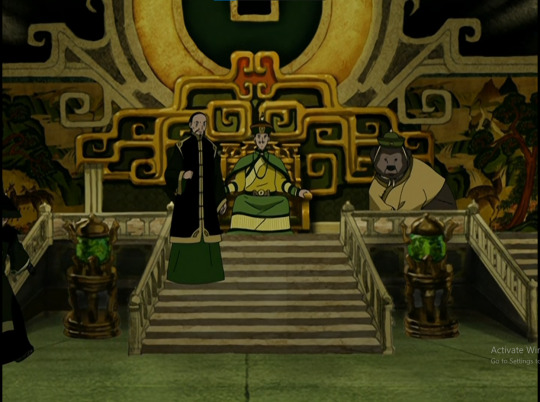
Long Feng, kept the King oblivious to the Hundered Year War and handled all matters that are not partying or charity events, making him the de facto ruler of Ba Sing Se without even the King's knowledge, essentially paving a way for his betrayal.
Exhibit B:
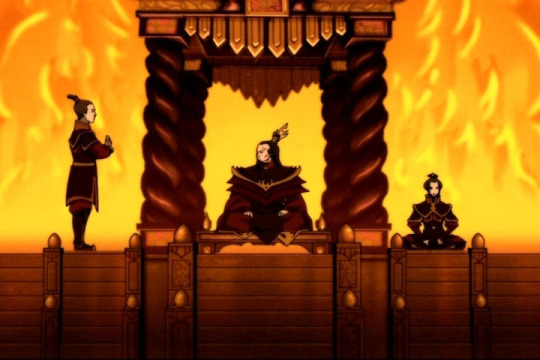
Zuko, said it himself, that he was literally at his father's right hand. Even Azula got only the second best seat. And the next thing Zuko does? He betrays his father. I know what you're all thinking. But didn't Zuko already betray him before? Well, he did when he released Aang from Zhao as the Blue Spirit. But, the important point is, his explicit orders were to capture the Avatar to restore his honour. It didn't matter which methods he used to do it. He only ever openly betrayed his father during the eclipse and that was after he was placed at the right hand in the war meeting.
Exhibit C:
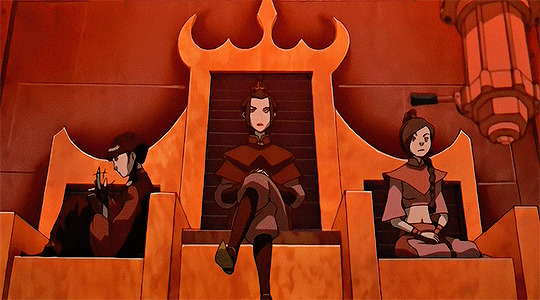
Mai, a betrayal that was a turning point in Azula's declining mental health. But hey, Ty Lee betrayed Azula too, right? Yes. But that doesn't change the fact that Mai did it first and she was sat at Azula's right hand. Mai never really feared Azula. She only followed her around out of her own will. Ty Lee on the other hand, when Azula recruits her at the circus, is found showing fear. She only had the guts to betray Azula after Mai did.
It really puts into perspective how Ty Lee couldn't betray Azula until provoked because she feared her, and Mai betrayed Azula because she didn't fear her enough. It further solidifies Azula's stellar line, "You should've feared me more!", insisting that if Mai had feared her more, she wouldn't have betrayed her. This especially holds true because it's later explained by Azula herself that, "Fear is the only reliable way." Fear kept Ty Lee in line but liberalised Mai cuz she didn't fear Azula more.
But all that goes out the window because Ty Lee betrayed Azula too. This is also one of the main reasons why Azula banishes most of the people around her. Because, "None of them can be trusted", and she trusted Mai as she knew Mai never feared her. It hurts her deeper because she trusted Mai and let her mantra of "Fear is the only reliable way" go, and guess what happens? She betrays her.
This solidifies three things in her brain: 1. Trust doesn't work, and, 2. Fear doesn't work either. 3. Nothing works, really.
Therefore, her action of banishing everybody with, "Sooner or later they all would've betrayed me."
This works for Exhibits A and B too. Long Feng never feared King Kuei and King Kuei completely trusted him until he learned of his betrayal. Trust didn't work, and fear didn't work either.
Zuko had never trusted his father. He only feared him. He has a physical scar on his body to prove it. But once that fear starts to deteriorate, he openly confronts his father and betrays him, letting go of his fear with, "It was cruel, and it was wrong!". Trust didn't work, and fear didn't work either.
So, what does work?
Well, the answer is pretty simple.
Love.
Love works. Any number and different kinds of love, be it platonic, or sibling, or romantic, it doesn't matter. It is foolproof!
Genuine care and affection for a person, doesn't let you betray them that easily. It's what made Sokka decide they should help Aang in Book 1. It's what made Yue turn into the moon. It's what made Toph come back to the Gaang again after she stormed off in Book 2. It's what made Aang come back for Bumi in Omashu in Book 2. It's what made Zuko find his path to Iroh again in Book 3.
The lack of love (from her own parents) is what made Azula's mental health deteriorate, as she thought nothing worked; it's depressing because she doesn't know that love actually works, cuz she's never known or experienced love her entire life, so she doesn't even consider it as an option.
The lack of love is what made the Dai Li betray Long Feng. The lack of it drove Zuko's betrayal to Ozai, Mai and Ty Lee's betrayal to Azula and even Jet's betrayal to Katara.
This could go on and on, but the end point here is that Azula's words on betrayal are true, but only when love is taken out of the equation. Love is the 'X' factor. Without it, there really is no equation, as all leads to zero.
#atla#ragzie yaps#my teeny tiny observations#avatar the last airbender#betrayal#atla analysis#long feng#azula#princess azula#mai#ty lee#mai and ty lee#zuko#prince zuko#ozai#firelord ozai#avatar the last airbender analysis#dai li#katara#jet atla#katara of the southern water tribe#sokka#sokka of the southern water tribe#iroh#uncle iroh#toph#toph beifong#princess yue#king bumi
181 notes
·
View notes
Text














Every SandRay Scene (84 ¦ ??)
R: "Sand?" S: "What?" R: "I think you should go back to selling booze." S: "Why?" R: "I don't know. I think it's the business that can help build your life. I don't want you to quit because I yelled at you or made a sarcastic remark to you." S: "It's not just that. If I'm with you and selling booze at the same time, it's risky for you." R: "Damn you. Anywhere can be risky. Booze is sold everywhere. You can't force the rest of the world to quit selling. Right? I must fight it myself. And you must trust me. Let's do this. Once the Liquor Liberalisation Act is approved, I'll be your investor." S: "Damn you. Haven't you heard that people in a relationship shouldn't risk doing business together?" R: "What risk? I'm rich and I want you to be rich too." S: "Alright, Young Master Ray from high society. Is that a deal?" R: "Yes." … R: "By the way. I want to rename the brand. What's the old name again." S: "Jude. I named it after the song Hey Jude by The Beatles." R: "I want an easy yet meaningful name. Like… RaySand. Or SandRay. I think it sounds nice when we put our names together." S: "I agree. But I actually prefer SandRay. It sounds like 'sunray'. It gives the vibes of 'the light of hope'." R: "Should I let you win this time?" S: "Yes." R: "It's good. We can save up money and go to music festivals around the world together. It's so good. Thank you for giving my life a clear goal." S: "You're making my life more fun too."
#only friends#only friends the series#sandraygifs#sandray#only friends sand#ray pakorn#gifs#thai drama#firstkhaotung#firstkhao#tusernix#tusersilence#tuserrowan#melontrack#khaotunq#userdragonz#tuserhidden#uservid#usermask#userjamiec#tusermona#userspicy#userlinnea#userlovevivi#useralien#fyeahthaidramas#asianlgbtqdramas
31 notes
·
View notes
Note
you've mentioned china's trade surplus effectively ripping of Chinese citizens (they are generating product but not getting access to it, I think?) and I was wondering... why? what benefit does this give to the people of China? I assume they operate that way for a reason but I don't know what the reason could be
I think it was a sensible strategy for at least 25 years or so, from when open policy began under Deng Xiaoping in 1979 up to the Beijing Olympics and Global Financial Crisis in 2008, then it became increasingly unhelpful but it was difficult to stop.
China was coming out of 30 years of Maoism when Deng took over, disconnected from the global economy, lacking infrastructure, and extremely underinvested: the GDP of Japan was 5x larger than China and it was exporting 10x as much as China, despite China having 8x more people.
under open policy, China created special economic zones across the south east and encouraged companies from Hong Kong and Taiwan to setup low cost operations there, then later invited US and European corporations too but always with strict conditions to partner with local businesses and state owned enterprises to ensure technology transfer (the classic story of investing in China is to do the work of setting up a partner company then later have that partner company take over the market).
at the same time as opening up to global markets (and getting rid of rations and price controls and switching to a market economy domestically), China poured resources into infrastructure investment, building factories and highways and bridges and docks and harbours and the largest high speed train network on the planet and vast cities of apartments to accommodate the biggest urbanisation project in history and so on and so on.
this transformed China at vast scale with shocking speed into the industrial powerhouse that it is today, with GDP 4x Japan and exporting 5x as much, an incredible turnaround from the 20th century, when cyberpunk authors were predicting the Japanese economy would eat the world.
but all that infrastructure and property development required to urbanise and industrialise was a massive investment, funded by the government and paid for by the hard work of Chinese households, whose incomes were suppressed by a range of mechanisms: fixed exchange rates and tariffs making imports expensive and helping exporters, bank spreads giving low deposit rates for savers and cheaper loans for favoured industries, the hukou system taking away rights from rural residents so they could be used as cheap labour in the cities much like undocumented immigrants in the US, and of course the labour movement was carefully controlled by the government and suppressed when its demands grew too strong.
the Chinese people paid for the transformation of China, but by and large I'd say it was well worth the effort: even if the politically connected elite siphoned off the top and wealth inequality increased, the overall quality of life improved enormously from the Maoist dark ages that preceded the open era.
the transition from the rationed economy to the market economy was rough, and inflation and unemployment not always perfectly managed, but the unrest of 1989 was relatively minor in the scheme of things, compared with the chaos and dysfunction of Russia's failed attempt to cross the chasm and liberalise its economy.
so that's the Chinese success story, which I think peaks in 2008, when China is inviting the world to the Beijing Olympics while America is busy spending billions of dollars invading other countries and has just blown up the global economy thanks to poor regulation of its banks inflating a mortgage bubble into a credit crisis.
however at this moment of triumph, China faces a quandary that it has not resolved to this day: the development model that has made it the industrial envy of the world has run its course and must be changed in order to continue steady growth, but it is very difficult to change course when politically connected vested interests owe everything they have to the continuation of these policies!
but first, why were exports important to China's growth in the first place? I think there are multiple reasons for this:
foreign companies that setup operations in China were focused on the export market because the Chinese people at the time had very little money, making them great workers but poor customers, and although the domestic market would steadily grow in size over time, the size of the global market and the suppression of local wages would continue to favour exports.
the government knew that the export market was highly competitive and would keep industry honest in a way that the domestic market might not, avoiding the problems seen in the USSR where protected industries could manufacture low quality products and faced little pressure to improve: "Made in China" would start cheap and then work its way up in quality, a classic tale of market disruption, as we see today with China subsidising Tesla factories as a rabbit for its own greyhounds (BYD) to chase.
possible geopolitical advantages to taking over critical industries for the entire world, along with an ideological bias in favour of production over consumption which means industries will habitually produce more than the domestic market can consume, requiring exports to meet the demand for demand.
so the problem was that over time China began to run out of opportunities for productive investment: when every person has an apartment and every river has a dozen bridges and the country is exporting a trade surplus of a trillion dollars a year it's time to slow down investment driven growth, shift towards consumption, pay households more, and let increased demand from Chinese consumers drive future development.
however, this requires reversing the transfers currently in place that take money away from households to subsidise exporters, which would immediately hurt export competitiveness and risk businesses downsizing and spiking unemployment -- much as we're seeing with Trump's tariffs in the opposite direction, any poorly managed change causes an economic downturn immediately but the potential economic growth is delayed, leading to a painful adjustment period and possible political instability.
as a result the Chinese government has been announcing plans to raise consumption and deleverage (reduce debt-fueled investment driven growth) for fifteen years now but it has balked from actually doing it every time, so the trade surplus mounts ever higher and popular discontent grows as -- much like America -- the people see the economic growth opportunities that their parents enjoyed now receding into the distance.
in theory the US could force this adjustment unilaterally, ideally by controlling financial investment from China (which is how China balances its enormous trade surplus) or much more clumsily by the kind of tariffs that Trump is levying (although bilateral tariffs may just push trade into more circuitous paths through other countries to evade them).
if the US no longer accepts Chinese trade surpluses then the government will have no choice but to shift the economy in a different direction, and perhaps it will be easier to justify the transition when the disruption can be blamed on a foreign adversary.
so if I had to summarise I would say that extracting wealth from the people can be beneficial if it is invested productively, but ultimately what makes an investment productive is that it meets demand from the people, that is what an economy is for, and we see countries experience growth booms when demand drives investment to meet demand and stagnate when demand drops and investment becomes increasingly unproductive, pushing on a piece of string in the hope that people will spend money they don't have if you just build enough shopping malls.
19 notes
·
View notes